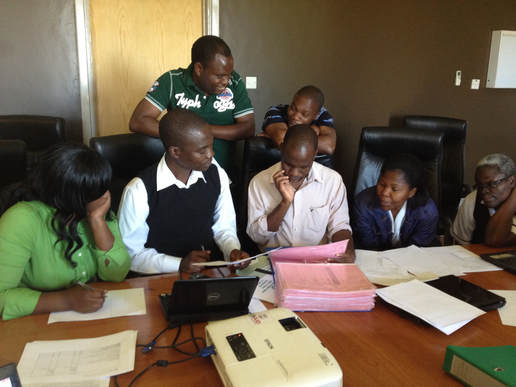Mentors lead MasterCard audit of exposed infants
|
Accurate records are essential for consistent patient follow-up care and program planning. With quality data, program implementation can be monitored effectively and any flaws identified in a timely manner. Ministry of Health (MOH) “pink cards” are useful in allowing HIV care providers to monitor an individual exposed infant until the child’s final outcome is known and he or she is managed accordingly.
The “pink card” is a tool that allows health care workers (HCW) to clinically follow HIV-exposed children from birth through the early infant diagnosis (EID) cascade until the child can be definitively diagnosed as either HIV-infected or HIV-uninfected. The process is simple -- a health provider opens a pink card at the infant’s birth, when information about the mother and baby are recorded. During each follow-up visit to HIV care clinic, information about the mother and child is recorded on the card. Information such as dates and results of HIV tests, weight and height of the infant, whether the child is still breastfeeding, and maternal adherence to anti-retroviral therapy (ART) are recorded and used in clinical decision-making and follow-up. The card thus provides guidance to clinicians to ensure no detail of care for the exposed child is overlooked, and that the child is followed up until a definitive diagnosis is made. |
Through routine clinical and systems mentorship visits to Mchinji District Hospital ART Clinic, the Tingathe mentorship team observed that a number of pink cards were not appropriately and accurately filled. Many errors were present, information lacking, and cards were often misfiled, for example Pink Cards for some children who were actively in care were inappropriately labeled as “lost to follow-up”. Further observation and inquiry revealed that much of the missing information was readily available within the clinic system, either in the Early Infant Diagnosis Log Book or the clinic registers. Without accurate completion of these pink cards, exposed children can easily be lost to follow up, and HIV infected children can be missed.
In order to validate the magnitude of the problem, the Tingathe program mentorship staff responsible for the site facilitated a sample Pink Card Audit in the second quarter of the reporting year. Teams of ministry of health clinic staff, Tingathe community health workers (CHWs), and nurse and clinician mentors carried out the exercise together, which was a valuable exercise in teamwork and partnership.
At Mchinji District Hospital, four hundred and forty one (441) pink cards were audited. Results revealed that 29.5% (130) of the cards were appropriately filled, while a remarkable 70.5% (311) of the cards had one or more errors or inappropriately filled sections. Following the initial audit, District ART/HIV Coordinators and clinic staff were briefed by the audit teams on the findings. The District HTC Coordinator then liaised with Tingathe staff onsite to conduct a refresher talk with concerned MOH staff on pink card completion. Over the course of the next several weeks, the team updated incomplete cards with new, accurate information. A follow-up audit showed that over 80% (445 out of 558) audited cards were up-to-date, accurate, and fully filled. Subsequent observation during clinic mentorship visits has shown significant improvement filling of the cards.
Inspired by the successful audit in Mchinji, other Tingathe mentorship teams conducted initial audits at Mponela Rural Hospital, Ntcheu District Hospital, Area 25 Health Centre, Dowa District Hospital, Madisi Mission Hospital, Kasungu District Hospital and Salima District Hospital. Recognizing the improvements made both in documentation and in clinical care provided to exposed children at sites where audits were conducted, teams of ministry of health staff and Tingathe CHWs and mentors unanimously agreed that annual audits should take place to ensure the improvements are sustained. Through close teamwork with the Ministry of Health staff and Tingathe CHWs, Tingathe mentors continue to strive to improve the care of children infected with and affected by HIV in Malawi.
In order to validate the magnitude of the problem, the Tingathe program mentorship staff responsible for the site facilitated a sample Pink Card Audit in the second quarter of the reporting year. Teams of ministry of health clinic staff, Tingathe community health workers (CHWs), and nurse and clinician mentors carried out the exercise together, which was a valuable exercise in teamwork and partnership.
At Mchinji District Hospital, four hundred and forty one (441) pink cards were audited. Results revealed that 29.5% (130) of the cards were appropriately filled, while a remarkable 70.5% (311) of the cards had one or more errors or inappropriately filled sections. Following the initial audit, District ART/HIV Coordinators and clinic staff were briefed by the audit teams on the findings. The District HTC Coordinator then liaised with Tingathe staff onsite to conduct a refresher talk with concerned MOH staff on pink card completion. Over the course of the next several weeks, the team updated incomplete cards with new, accurate information. A follow-up audit showed that over 80% (445 out of 558) audited cards were up-to-date, accurate, and fully filled. Subsequent observation during clinic mentorship visits has shown significant improvement filling of the cards.
Inspired by the successful audit in Mchinji, other Tingathe mentorship teams conducted initial audits at Mponela Rural Hospital, Ntcheu District Hospital, Area 25 Health Centre, Dowa District Hospital, Madisi Mission Hospital, Kasungu District Hospital and Salima District Hospital. Recognizing the improvements made both in documentation and in clinical care provided to exposed children at sites where audits were conducted, teams of ministry of health staff and Tingathe CHWs and mentors unanimously agreed that annual audits should take place to ensure the improvements are sustained. Through close teamwork with the Ministry of Health staff and Tingathe CHWs, Tingathe mentors continue to strive to improve the care of children infected with and affected by HIV in Malawi.

